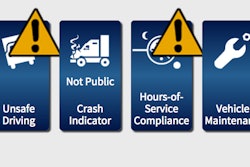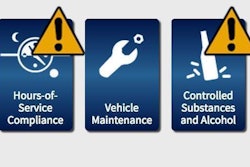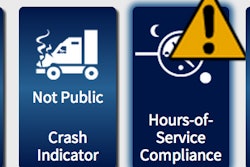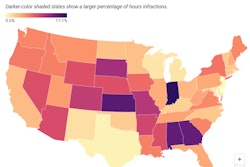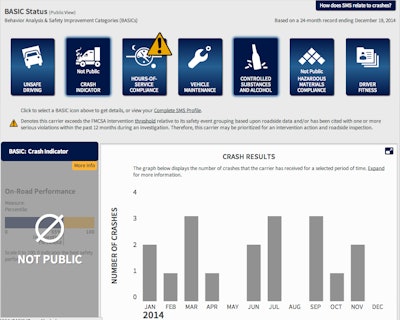
Industry groups, however, have expressed disagreement and disappointment with the agency’s conclusions, which FMCSA released last week within a study. Click here to read more on the study and the agency’s conclusions and methodology.
David Owen, President of the National Association of Small Trucking Companies, said in a phone interview that his association stands by the need to account for accident fault. He suggested the agency adopt a simple weighting system to account for crashes where there was no or shared fault determination, crashes that were clearly the fault of the truck driver and crashes that were clearly not the truck driver’s fault. “These weighted adjustments,” he said, would “represent a fair approach” and would be “easily accomplished.”
For shared or undetermined fault, he said, assign a weight of 2. For accidents clearly the truck driver’s fault: 4; clearly not the fault of the trucker: .01.

The current system, he added, “totally discriminates” against carriers unlucky enough to have been involved in a crash that was in no way the driver’s fault. “The only thing the industry wants is to get rid of the absurd situations where it’s obvious” the trucker did nothing wrong.
Such as one American Trucking Associations’ Executive Vice President Dave Osiecki pointed to just last week in the wake of FMCSA’s announcement on crash weighting. “Instances where a truck is rear-ended by a drunk driver, or hit head-on by a motorist traveling in the wrong direction on the interstate, or as happened just Monday [last week] when a truck was struck by a collapsing bridge are clearly not the fault of the professional driver,” Osiecki said, “and certainly should not be used to target his or her carrier for potentially intrusive government oversight.”
Both ATA and the Owner-Operator Independent Drivers Associations released statements last week reiterating their stance on crash fault weighting in CSA: The program has a potentially major problem with fairness if crash accountability continues to be left out, they noted, echoing NASTC.
“We want to be fairly judged and not be penalized by crashes our professional drivers could not reasonably avoid,” said ATA Chairman Duane Long of Longistics in Raleigh, N.C. “It’s not only a fairness issue; it’s a good government oversight approach. We continue to trust FMCSA might eventually arrive at this conclusion.”
OOIDA also pointed to the public nature of CSA rankings and data as reason why the data set used should be as fair as it could be.
“If the agency is providing information to the public that is to be used to make safety decisions or conclusions, that information should be relevant, accurate and as complete as humanly possible,” OOIDA said in a statement.
ATA Executive VP Dave Osiecki says his group has asked FMCSA repeatedly since 2010 to simply screen out crashes in which it was clear the truck driver involved was not at fault.
Though the Crash Indicator Behavioral Analysis and Safety Improvement Category in the CSA Safety Measurement System does not provide percentile measures, or “scores,” to the public, a bevy of data listing all of any carrier’s crashes are available at a quick glance, with no measure of fault determination. Some shippers and brokers, furthermore, as Overdrive has reported in the past, require disclosure of the Crash Indicator score as a condition of doing business.
Follow this link to file an official comment on FMCSA’s Crash Weighting study. Read the analysis in full at this link.
Fault should matter, noted many readers in reaction to FMCSA’s release of the Crash Fault Weighting study, in any tabulation of motor carrier safety that is going to be used to make business decisions by members of the general public. Noted David S. McQueen, “By leaving out ‘at fault’ or ‘no fault,’ it presents both vehicle operators in a false light. I’d rather the police make a spot determination and allow the parties involved contest it later rather than to simply leave it to the imagination of whoever peruses the SMS data.”
The lack of uniformity in the treatment of crash fault on police accident reports in jurisdictions around the country has often been cited as a strike against using fault determinations in the CSA SMS. Doing so might just open up a new problem with geographical disparities in the accounting.
While most responding readers offered support for either removing the Crash Indicator altogether or adding some kind of fault accounting, others weren’t so keen on the necessary reliance on police accident reports to determine fault in a timely manner to be reflected in the SMS.
“I’m with the feds on this one,” wrote Stan Brown. “I don’t want some [police] officer making that determination. As a former safety director and crash investigator myself, I absolutely disagreed with over half of the police reports on crashes that assigned fault to the CMV driver. I’m afraid the data would be worse for us — not better — and by the time you got the appeal done and it overturned (at your expense for the experts, etc),” the crash would have run its two-year course in the SMS and “would be falling off anyway. The harm of a false preventable” would already have been done.

